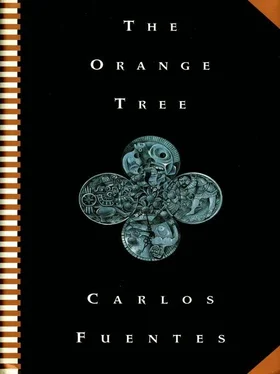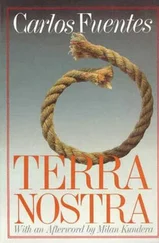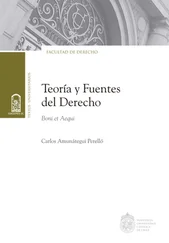MARTÍN 1
By God in heaven: I didn’t invent the parties and uproar of the Mexican colony; by His Holy Mother, I reached a capital already enamored of luxury and parties, where wild bulls were run in Chapultepec and excursions on horseback echoed through the forests: jousts, rings, mock duels. The viceroy, Don Luis de Velasco, said that even if the King were to deprive the criollos of their towns and estates the viceroy would see to it they were consoled by having bells rung in the streets. So, when the viceroy died, there was great sadness. Everyone, young and old, wore mourning, and the troops about to sail for the Philippines dressed for the funeral with black flags and emblems of grief, their drums muted, dragging their pikes. A gray, weak, and boring Interim Council took over the government while a new viceroy was being named, but Alonso and I, royal heirs to New Spain, because we were sons of conquistadors, respectful of the dead viceroy and the viceroy to come — though not of the mediocre Council — decided to keep alive joy, luxury, and the rights of heirs in these lands conquered by our fathers.
The viceroy died; he wasn’t the first and wouldn’t be the last. The viceroys changed; we, the heirs of the conquest, remained. The viceroy died, but I had twin sons and felt that was sufficient reason for shedding the mourning I wore for the viceroy and showing the Council who the real owners of New Spain were. My brother wants me to tell it: I’ll give him that pleasure. On our own, we took over the main square; half the houses in it were ours in any case. I had a raised wooden walkway constructed from my house to the cathedral to open a path for the procession, so I could carry my sons to the Door of Pardon and announce to the world that now there were grandsons of Hernán Cortés to maintain our dynasty. I announced it with noise, of course. Artillery, tourneys on foot on the walkway, and feasts to which all were invited, Spaniards and Indians. Roasted bulls, chickens, and game, pipes of red wine for the Spaniards. For the Indians, an enclosure of rabbits, hares, and deer, following tradition, along with myriad birds. When the enclosure was broken open, they all came out running and flying, to be shot with arrows and given to the humble people, who were delighted and thankful. Jousts, fireworks, piñatas … A week of feasting, surrounded by the people, with toasts, masquerades, and, at the end, a grand dinner and soiree as a culmination of the celebration, given by my true brother Alonso de Ávila at his house.
What a beautiful surprise we gave to all — to our relatives and friends but also to the rancorous Council: the enviable contrast of one table made up of insignificant lawyers and ink-pissing officials and the other, opulent one made up of hidalgos who, if we piss anything at all, it’s pure gold! Laughing childishly, I followed the suggestions of my trickster friend Ávila. We dramatized, to the astonishment and praise of the guests, the interview between my father, Hernán Cortés, and the emperor Moctezuma, when my father was the first — the very first, are you all listening? — white man to see the grandeur of the Great Tenochtitlán.
I of course played the part of my father. Alonso de Ávila dressed up as Moctezuma, placing around my neck a chain of flowers and jewels, telling me in a loud voice: “Not only do I venerate and respect you but I obey you. I am your vassal.” (In my ear he whispered, “I love you like a brother.’) Everyone applauded the pageant with pleasure, but I felt how the joy settled into another kind of delight when Alonso de Ávila, catching me unawares, placed a crown of laurel on my head and, smiling, awaited the exclamation of the guests: “Oh, how well the crown suits your lordship!”
MARTÍN 2
I wasn’t invited to those celebrations. But I watched them from a distance. Actually from close up, from very close up, I was keeping an eye on things. I mixed in with the crowd, at the barbecue pits, the pulque stands, next to the people making wicker chairs, tortillas, carrying pots of drinking water; next to the ditches and dumps and eating stands, I listened to the new, secret language being forged between Nahuatl and Spanish, the secret curses, the secret sighs of this man who just yesterday was a priest and is now an old pockmarked ruin, or that man who was as much the son of an Aztec prince as my brother and I are sons of the Spanish conquistador, but now he was carrying loads of firewood from house to house, and my brother had his twins baptized in the cathedral, but the sons and grandsons of Cuauhtémoc were entering the same cathedral on their knees, their heads bent forward, their scapularies like chains pulled by the invisible hand of the three gods of Christianity, Father, Son, and Holy Spirit, the dad, the kid, and the succubus: Which one do you like best, new little Mexican boy, Indian and Castilian like me, the daddy, the brat, or the ghost?
I saw them there in the festivities with which my brother celebrated his progeny, saw them inventing for themselves a color, a language, a god — three instead of a thousand. Which language? Will you call him the son or the escuincle, a boy or a chaval, a turkey or a guajalote, Cuauhnáhuac or Cuernavaca, where my brother was born, agave or maguey, black beans or frijoles, kidney beans or ejotes? Which God: mirror of smoke or Holy Spirit, plumed serpent or crucified Christ, god that demands my death or God that gives me His, sacrificing father or sacrificed Father, obsidian knife or cross? Which Mother of God: Tonantzín or Guadalupe? Which language? If it happens to be Spanish, much of it comes from Arabic: Guadalupe herself, Guadalquivir, Guadarrama, alberca, azotea, acequia, alcoba, almohada, alcázar, alcachofa, limón, naranja, ojalá? Which language? If it happens to be Nahuatl: Seri, Pima, Totonaca, Zapoteca, Maya, Huichol?
At night, I stroll around among the fires from the torches lit to celebrate the criollo descendants of my whoremongering and insatiable father, wondering about my own blood, my progenitors and my progeny as well. Which will it be? I look at the dark skin, the glassy eyes, the averted eyes, the laden backs, the callused hands, the split feet, the pregnant wombs, the worn-out teats of my Indian and mestizo brothers and sisters, and I imagine them — barely forty years ago! — occupying their proper places, hoarding fortunes, doing what they pleased, commanding sacrifices, demanding tribute, receiving the solar gold on their heads and shooting it forth from their haughty stares, overcoming the sun itself, overcoming gold itself!
Exactly the same as my brother Martín and his pal Ávila, and the damned twins baptized today in the name of the God who conquered my mother with one single, outrageous announcement: Stop dying for me; look, I died for you. Son-of-a-bitch Jesus, king of faggots, you conquered my mother’s people with the perverse pleasure of your phallic nails, your sour semen, the lances that penetrate you, and the humors you distill. How to reconquer you? What name shall I give to our next time: reconquest, counterconquest, anticonquest, retroconquest, cuauhtémoconquest, preconquest, shitconquest? What will I do with it, with whom will I make it, in whose name, for whom? My mother, Malinche, without whom my father wouldn’t have conquered anything? Or my father himself, stripped of his conquest, humiliated, dragged to court, worn out in banal trials and perverse paper wars, accused a thousand times, and only punished in an eternally postponed decision? Sword of Damocles, Cuauhtémoc’s flint knife, the stiletto of the Hapsburgs, it all hangs over our heads and my brother Martín knows it. He amuses himself, sharing Alonso de Ávila’s arrogance, he doesn’t realize how the Council sees him. As the owner of the city. He doesn’t realize the Council can do nothing against him: a junta of mediocre men, cowards immersed in an unresolved collegiality, lacking authority. They see that a conspiracy is forming, that danger approaches, but they fear Martín, my brother, they fear him … And he doesn’t know it. Nor does he know that they restored our father’s property to him to keep him quiet and lead him out of the temptations of political power. I tell him and he almost hangs me, calling me envious, the son of a whore; he has his money with no conditions, like a free man. He shouted that at me, and I say, in my perpetually opaque, perpetually obsequious voice, high-pitched with melancholy: “Well then, prove it. Do what they fear most.”
Читать дальше












